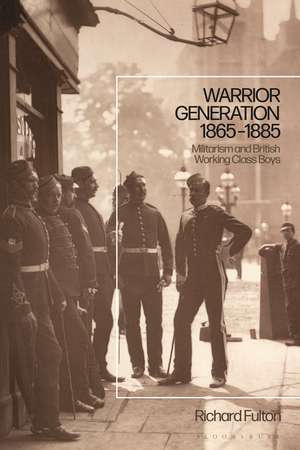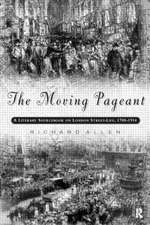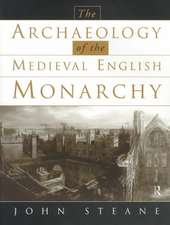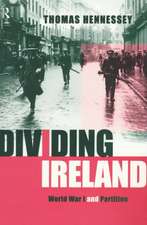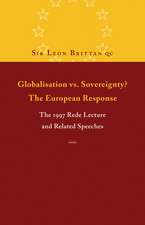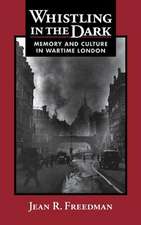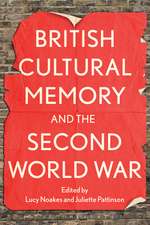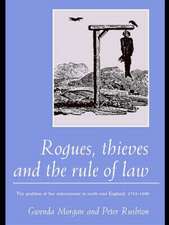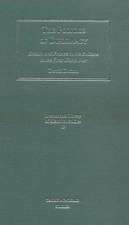Warrior Generation 1865-1885: Militarism and British Working Class Boys
Autor Dr Richard Fultonen Limba Engleză Paperback – 23 feb 2022
| Toate formatele și edițiile | Preț | Express |
|---|---|---|
| Paperback (1) | 200.45 lei 6-8 săpt. | |
| Bloomsbury Publishing – 23 feb 2022 | 200.45 lei 6-8 săpt. | |
| Hardback (1) | 600.80 lei 6-8 săpt. | |
| Bloomsbury Publishing – 5 aug 2020 | 600.80 lei 6-8 săpt. |
Preț: 200.45 lei
Preț vechi: 259.31 lei
-23% Nou
Puncte Express: 301
Preț estimativ în valută:
38.36€ • 39.90$ • 31.67£
38.36€ • 39.90$ • 31.67£
Carte tipărită la comandă
Livrare economică 14-28 aprilie
Preluare comenzi: 021 569.72.76
Specificații
ISBN-13: 9781350197169
ISBN-10: 1350197165
Pagini: 344
Ilustrații: 12 bw illus
Dimensiuni: 156 x 234 mm
Greutate: 0.48 kg
Editura: Bloomsbury Publishing
Colecția Bloomsbury Academic
Locul publicării:London, United Kingdom
ISBN-10: 1350197165
Pagini: 344
Ilustrații: 12 bw illus
Dimensiuni: 156 x 234 mm
Greutate: 0.48 kg
Editura: Bloomsbury Publishing
Colecția Bloomsbury Academic
Locul publicării:London, United Kingdom
Caracteristici
Offers an impressive synthesis of source analysis, from magazines, toy advertisements, periodicals and educational materials to HMI School Inspector reports and library records.
Notă biografică
Richard Fulton is Visiting Faculty in English at Washington State University.
Cuprins
List of FiguresChapter 1. Introduction and the Warrior Generation Chapter 2. The Military and the Warrior GenerationChapter 3. Work and FamilyChapter 4. School and SchoolingChapter 5. Leisure, Play, EntertainmentChapter 6. Reading, and Some ConclusionsBibliographyIndex
Recenzii
In this narrowly defined but deeply researched study, Fulton explores the activities that shaped the lives and attitudes of lower-class boys in late Victorian Britain. He shows that pervasive messaging in education, entertainment, and popular media contributed to a growing culture of masculinity and adventure, but generally failed to militarize a generation ... While focusing on a particular period, age group, and issue, Fulton offers a porthole to Victorian culture as a whole.
Warrior Generation is an excellent example, especially for graduate students, of how to question or challenge traditional academic conceptions.
In Warrior Generation, Richard Fulton pulls apart the argument that the military had become more popular by the end of the nineteenth century due to the indoctrination of boys through schooling, fiction, recreational activities, and national discourses. He adroitly takes the reader through the realities of boy culture, demonstrating that most lads were well aware of the division between fact and fiction. Most took their opinion of the army from personal acquaintance with recruits and local opinions, preferring to take local jobs rather than join up. Fulton looks deeply into the activities that shaped late Victorian lower-class boyhood to show that education, leisure, and even membership in the Boys Brigade seldom led to a higher opinion in the armed services. Geography and history texts, he demonstrates, were often read in the same way as popular adventure magazines: as broadly supportive of Britain's place in the world. However, few lads uncritically accepted them as templates for living. Readers will find that Warrior Generation offers a lively account of boy life accompanied by Fulton's penetrating analysis of the resilience of lads in the face of narratives of imperial and military power.
Fulton's readable, well-documented and thoughtful study addresses how working-class and often poor English young men thought about the Army and their relationships to it. In doing so, the author addresses enduring and central questions about culture, class and militarism. Writing with wit and clarity, Fulton is willing to take on orthodox views about the pre-1914 Tommy and what others said and wrote about him. We learn a lot about what the common young man and his middle- and upper-class contemporaries thought about his putting on a uniform, marching and perhaps going on a great adventure, from which he might not return. The author addresses these and other later-Victorian matters with professionalism, nuance and common sense.
A spirited look at the "warrior generation" in Victorian Britain-working-class boys born and growing up from 1865 to 1885-and their attitudes toward the army and warfare. Fulton eschews large analytic categories like Imperialism and avoids facile generalizations about militarism in favor of a richer, more nuanced account of the culture of boyhood and its influence on changing attitudes toward the military. Buttressed by careful consideration of contemporary periodicals and working-class autobiographies, this work provides a valuable corrective to previous accounts and a window into multiple aspects of late Victorian culture.
This book offers an insistently revisionist interpretation of later Victorian cultures of imperialism and militarism as they were experienced by working class boys and young men born in the twenty-year period denominated in its title. In taking this approach, it also offers a case-study of the potential for generational analysis in Victorian history.
Warrior Generation is an excellent example, especially for graduate students, of how to question or challenge traditional academic conceptions.
In Warrior Generation, Richard Fulton pulls apart the argument that the military had become more popular by the end of the nineteenth century due to the indoctrination of boys through schooling, fiction, recreational activities, and national discourses. He adroitly takes the reader through the realities of boy culture, demonstrating that most lads were well aware of the division between fact and fiction. Most took their opinion of the army from personal acquaintance with recruits and local opinions, preferring to take local jobs rather than join up. Fulton looks deeply into the activities that shaped late Victorian lower-class boyhood to show that education, leisure, and even membership in the Boys Brigade seldom led to a higher opinion in the armed services. Geography and history texts, he demonstrates, were often read in the same way as popular adventure magazines: as broadly supportive of Britain's place in the world. However, few lads uncritically accepted them as templates for living. Readers will find that Warrior Generation offers a lively account of boy life accompanied by Fulton's penetrating analysis of the resilience of lads in the face of narratives of imperial and military power.
Fulton's readable, well-documented and thoughtful study addresses how working-class and often poor English young men thought about the Army and their relationships to it. In doing so, the author addresses enduring and central questions about culture, class and militarism. Writing with wit and clarity, Fulton is willing to take on orthodox views about the pre-1914 Tommy and what others said and wrote about him. We learn a lot about what the common young man and his middle- and upper-class contemporaries thought about his putting on a uniform, marching and perhaps going on a great adventure, from which he might not return. The author addresses these and other later-Victorian matters with professionalism, nuance and common sense.
A spirited look at the "warrior generation" in Victorian Britain-working-class boys born and growing up from 1865 to 1885-and their attitudes toward the army and warfare. Fulton eschews large analytic categories like Imperialism and avoids facile generalizations about militarism in favor of a richer, more nuanced account of the culture of boyhood and its influence on changing attitudes toward the military. Buttressed by careful consideration of contemporary periodicals and working-class autobiographies, this work provides a valuable corrective to previous accounts and a window into multiple aspects of late Victorian culture.
This book offers an insistently revisionist interpretation of later Victorian cultures of imperialism and militarism as they were experienced by working class boys and young men born in the twenty-year period denominated in its title. In taking this approach, it also offers a case-study of the potential for generational analysis in Victorian history.
